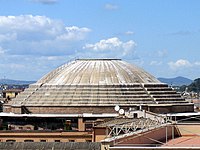
Photo from wikipedia
Abstract Coarse aggregates increase inhomogeneity and alter rheological properties of self-compacting concrete. In this work, the effect of coarse aggregates on self-compacting concrete is studied by considering its pipe flow.… Click to show full abstract
Abstract Coarse aggregates increase inhomogeneity and alter rheological properties of self-compacting concrete. In this work, the effect of coarse aggregates on self-compacting concrete is studied by considering its pipe flow. Self-compacting concrete is modelled as suspension of coarse aggregates in cement mortar and a two-phase Smoothed Particle Hydrodynamics (SPH) model is employed. Cement mortar, a yield-stress fluid, is modelled by fluid SPH particles, while each coarse aggregate is represented by a group of solid SPH particles, which moves as a rigid body. Simulation results show that, at the same volume fractions, the flow rate is higher for larger coarse aggregates, that is up to 24% in the investigated cases. Both effective yield stress and effective plastic viscosity of the concretes increase with the coarse aggregate content. Effective yield stress is smaller for bigger coarse aggregates. The reduction in effective yield stress is a consequence of bigger averaged gap between larger coarse aggregates through which the cement mortar flows.
Journal Title: International Journal of Mechanical Sciences
Year Published: 2021
Link to full text (if available)
Share on Social Media: Sign Up to like & get
recommendations!